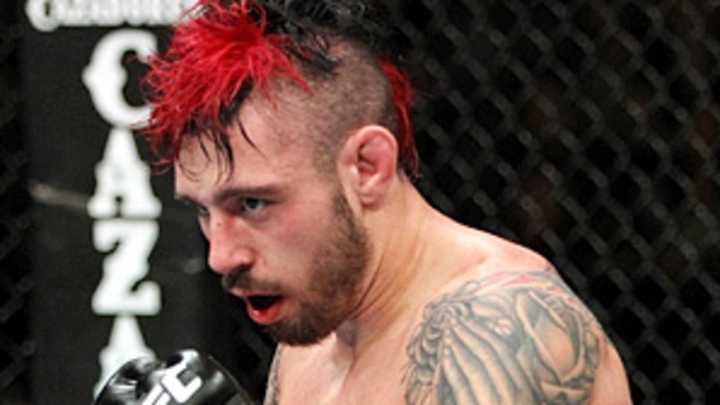Hardy's predictable, appealing style a blessing -- and a curse


I have to admit, when UFC welterweight Dan Hardy said he felt like he was fighting for his job against Anthony "Rumble" Johnson last weekend in Seattle, I didn't believe him. Not only did I not think he stood a good chance of being cut with a loss, but it was also hard to believe that even he believed it.
Yes, he was coming off two straight losses in an organization that has historically regarded three as the magic number that results in unemployment, but come on. He was still Dan Hardy. He was still a charismatic British slugger with a mohawk that would make '80s punk bands jealous. He still had an army of fans and a solid relationship with the UFC, so how could he really be that worried about his job? Who in their right mind would fire this guy?
Then Hardy went out in UFC Fight Night 24 and lost a unanimous decision to Johnson -- who did the exact opposite of what he said he would do when he chose to outwrestle Hardy rather than stand and trade with him -- and the question had to be asked: Was the UFC seriously considering dropping Hardy from the roster?
The answer: of course not. The three-strikes principle is more of a guideline than a rule, after all. UFC president Dana White told MMA Junkie that he "[expletive] love[s] that kid," and so no pink slip was forthcoming even after a trifecta of losses.
On one level, keeping Hardy around makes good business sense. He's still a draw, and at 28 he probably still has some good years ahead of him. He's intelligent and likable, plus he's a much better fighter than he often gets credit for. Not to mention the fact that the loss that started his current skid came against welterweight champion Georges St-Pierre, so cut the guy some slack, will you?
On the other hand, it's obvious that at least part of the reason for Hardy's continued employment is his fighting style. Fighters who bore the UFC brass even in victory sometimes need only one loss to end up out in the cold. But Hardy? He stands and bangs and gladly accepts whatever consequences come with it, and that tends to produce exactly the kinds of fights fans love, which in turn tends to produce a smile on White's face.
Or at least, that's the result when Hardy can find a willing partner. St-Pierre decided that there was no point in rolling the dice against a power puncher with subpar takedown defense, and then more recently Johnson -- much to the dismay of the fans in Seattle and, more than likely, the UFC -- arrived at the same conclusion. Hardy spent all night on his back against those two, and in between he found time to get knocked stiff by Carlos Condit at UFC 120.
This begs the question: What do you do with a striker when you run short of opponents who will strike with him? Rather than wait for the UFC's answer, Hardy has come up with one of his own: Call out Chris Lytle.
You have to admit, there's a certain irrefutable logic at work here. Lytle has been the go-to guy for many a welterweight looking to get into a bonus-worthy brawl. Hardy needs someone who isn't so hungry for a win that he no longer cares about entertaining, and if Lytle has proved anything over the last couple of years, it's that he is that someone.
On paper, a Hardy-Lytle bout is a slugfest that would bolster any fight card. Then again, I would have said the same about Hardy-Johnson, but still. With the exception of Jorge Gurgel, no fighter is more willing to temporarily forget about that jiu-jitsu black belt hanging in his closet than Lytle. The man is an entertainer who could easily be persuaded to refrain from exploiting Hardy's glaring weaknesses for the sake of a crowd-pleasing brawl.
It's hard not to wonder, though: Is that really what we want from our MMA?
It's not that I don't love to see two men go toe-to-toe in the center of the cage with little regard for their own safety. Without a doubt, that holds a certain appeal. But at the same time, isn't the completeness of it part of what we love about MMA? Isn't the whole point that you can't just be good at one aspect of fighting and still be good at this sport?
It's one thing to arrange interesting style matchups, but once we start consistently aiming for kickboxing matches in four-ounce gloves, that's when I have to question whether we aren't missing the point.
In asking for Lytle via Twitter, Hardy said he wanted "[a]n oldschool shootout with a guy that wants to throw down." (For his part,Lytle embraced the idea.) But if you want to throw down so badly, shouldn't it be your responsibility to make sure you don't get taken down instead?
It's not that I can't understand a fighter going in search of a favorable style matchup after three straight losses -- again, Hardy is a smart guy in many respects. But I can't help but wonder: After his grappling deficiencies cost him two of his last three bouts, is seeking out an opponent who won't test that part of his defense really the answer he needs? Better yet, if Hardy actually gets that shootout he's looking for and still can't halt his losing streak, what then?
As nice as it is to be an entertainer when the situation allows, it's far safer for your long-term employment prospects to focus on fixing the holes in your game before anyone else gets a chance to walk right through them.
